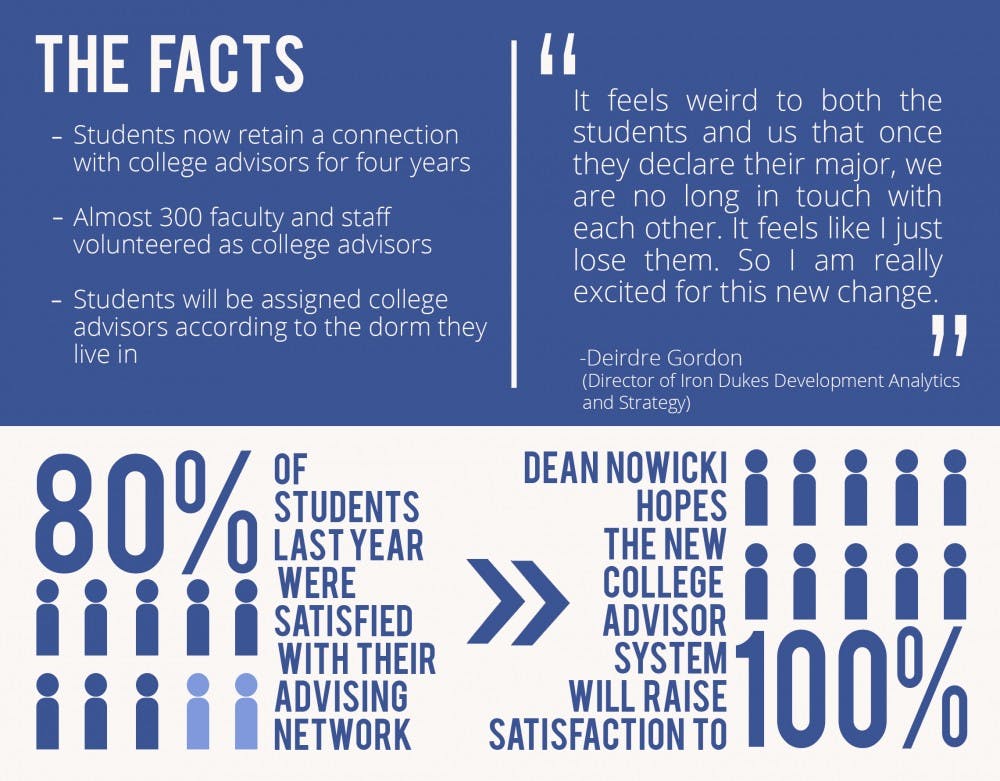Recent changes in the student advising system hope to make the advising process more fulfilling for both students and advisors.
Starting this year, students will have the choice to keep a formal connection with their "college advisors," previously called pre-major advisors, who are assigned to students when they first come to Duke. After declaring their major as sophomores, students are also given a major advisor.
“The goal of advising is often thought, first in transitional terms, such as approval of a schedule and drop and add courses, but what we have been trying to do over the last few years is to move advising to be not as transactional but more of a mentorship,” said Steve Nowicki, dean and vice provost for undergraduate education.
David Rabiner, director of the Academic Advising Center and associate dean of Trinity College, explained that the change of the title from “pre-major advisors” to “college advisors” reflects the broader role that advisors can play in students’ college lives.
“‘Pre-major’ tends to imply that once you have declared the major, you have ended the connection with this previous advisor," Rabiner said. "The 'college advisor' title reflects the goal that students will retain a connection with their advisor over four years, even after they declare and have an advisor in their major assigned.”
He also noted that in the past, after the students declare their majors, pre-major advisors no longer have access to students’ academic information—including notes made during meetings about the students' plans and goals—on DukeHub.
Losing this information, he said, could be confusing if a student decides go back to their advisor to ask for a recommendation letter later in their academic career. Now, students will be able to choose to retain relationship with their college advisor when they complete an advising survey as part of the major declaration process.
Rabiner added that this year nearly 300 faculty and staff members, including people from the law school and the medical school, voluntarily serve as college advisors. The number of first-year students that each college advisor mentors ranges from three to 12, depending on the advisor’s choice.
Some students said they look forward to developing deeper connections with their college advisors.
“My advisor has been very helpful to me, although we have met only twice so far,” freshman Ziwei Zhang said. “I would love to discuss more meaningful topics and talk about things other than academics.”
Current college advisors also praised the new change for helping to build student-advisor relationships.
“It feels weird to both the students and us that once they declare their major, we are no long in touch with each other, " said Deirdre Gordon, a college advisor and director of Iron Dukes Development Analytics and Strategy. "It feels like I just lose them. So I am really excited for this new change.”
Gordon added that another change made this year will make the advising process even more cohesive—students will be assigned college advisors according to the dorm they live in, so that for each college advisor, the advisees all live in the same residential hall and have the same academic dean.
Nowicki said he hopes students can also take advantage of other resources in the student advising system such as the deans of academic engagement.
“Our goal of the coming year is to expand the number of DAEs and make students more aware of what those folks can do,” he said. “Their primary goal is to be resourceful to students, but also to faculty, to help people understand what the opportunities are. ”
Rainer added that a survey last year showed that 80 percent of the current juniors rated their overall guidance received from their advisor as either good or excellent. It also noted that students who reached out and made use of their advising network regarded their entire advising and college experience more positively.
“Advising used to have a bad reputation both among the students and the faculty members, not only because it is time-consuming but also because it is purely transactional," Nowicki said. "So we are making those changes and adjustments, and there is more work to be done. My goal is that the number of students who think they got good advising is 100 percent.”
Get The Chronicle straight to your inbox
Signup for our weekly newsletter. Cancel at any time.

